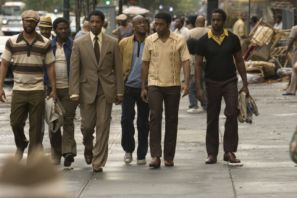Mark:
One of the greatest difficulties facing film audiences in modern times is to be able to insulate themselves against the hype and advertising of the Hollywood machine so as to experience films without preconceived notions or expectations. In many cases the critical opinion travels to Australia in advance of the films themselves, and in the case of critically acclaimed films can often lead to hopes being set too high. Thus it is with American Gangster.
 The film focuses on two strong male leads. Denzel Washington is Frank Lucas, bodyguard and driver to Harlem gangster Bumpy Johnson. When Johnson dies unexpectedly, Lucas is given the opportunity to redefine the business and reap the incredible financial rewards. Meanwhile, Russell Crowe is Detective Richie Roberts, an honest cop at a time of considerable corruption and greed. His decision to hand in (rather than keep for himself) a million dollars in unmarked drug money will lead to his promotion to head of a Narcotics taskforce, and eventually to a showdown with Lucas.
The film focuses on two strong male leads. Denzel Washington is Frank Lucas, bodyguard and driver to Harlem gangster Bumpy Johnson. When Johnson dies unexpectedly, Lucas is given the opportunity to redefine the business and reap the incredible financial rewards. Meanwhile, Russell Crowe is Detective Richie Roberts, an honest cop at a time of considerable corruption and greed. His decision to hand in (rather than keep for himself) a million dollars in unmarked drug money will lead to his promotion to head of a Narcotics taskforce, and eventually to a showdown with Lucas.
The great strength of American Gangster is the performances of its leads. Both Washington and Crowe are so powerful in their roles, giving their all for this film to succeed. It has been some time since Crowe has been so impressive – 2006’s A Good Year was received especially poorly -yet here he is the epitome of slow-burning frustration and driving commitment to his cause. Similarly, Washington gives a bravura turn as mobster Lucas – he spends more time on screen than Crowe as Lucas is the force behind all that occurs in this depiction of life in Harlem during the Vietnam war era. Were Washington not so good, American Gangster would have been doomed.
The problems start with the running time: 157 minutes is just too long to maintain the dramatic intensity, and there are inevitably scenes that let it slip. Scattered episodes are frankly unnecessary, but the sequences designed to add colour to two otherwise very single-minded characters are often underdone or unfinished – in particular the subplot around a custody battle between Roberts and his ex-wife, although useful in defining his character, seems to end rather abruptly and is caught between being a minor subplot and a story in its own right.
The introduction of Lucas’ family to his business seems incongruous for a man so aware of the strengths and weaknesses that allow him his greatness, and the action that will lead to his fall goes against his own stated principles in a moment of unlikely madness. Perhaps this is how it really was – American Gangster is based on real people and events after all – but these moments jar with the portrayal of Lucas as a man in total control of himself and his surroundings.
That American Gangster is based on a true story should not give it license to be so unwieldy, and while the performances of both Washington and Crowe are especially good, their leading turns cannot make up for several problems with deciding what is in- and excluded from this portrayal of street life in the 70s. Most disappointing is that American Gangster had the potential to be truly great.
Rating: